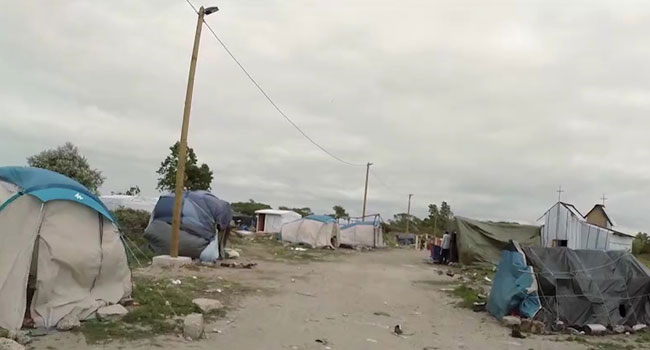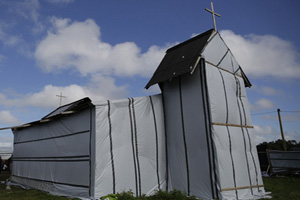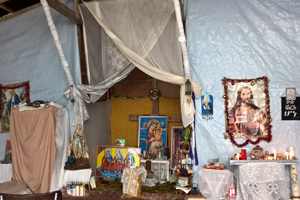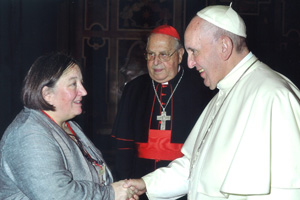September 24, 2018
Mercy Day
Imagine bedding down every night sheltered from the wind and rain only by a ragged make-shift tent. Imagine having to sleep in groups of six in that tent, huddled together out of fear of being sexually assaulted during the night. Imagine, upon waking, having to use the same few filthy toilets that are shared by thousands of others. Imagine this magnified by circumstances such as menstruation, pregnancy, breastfeeding, the responsibility for children. Imagine, then, having to queue hours for food to ease your hunger. Imagine, if you can, living with the constant fear of violence, whether from the authorities who wish you were not here, or from the prostitution rings and smuggling gangs which are becoming more prevalent with every passing day. Imagine, finally, having to live this life whilst still dealing with the almost unspeakable horrors that you experienced on your journey to get here.

Still taken from 'Emergency operation in the "jungle"', six minute video report by Secours Catholique-Caritas France, partners with CSAN (Caritas Social Action Network), the social action arm of the Catholic Church in England and Wales. Sr Lynda is a Trustee of CSAN
For many of the between 200 and 400 women at any one time living in ‘the Jungle’ refugee camp in Calais, they need not imagine, for this is their reality. Sexual abuse and violence are used as strategies to deprive women and girls of their civil rights. During their dangerous journeys, many women and young girls are exposed to sexual violence, rape, prostitution and trafficking. Women and girls are being forced into sex in exchange for food and housing.
Yet, for all of the media attention these past few months on the refugees living in Calais, these women have been largely absent. We have become used to the images of the many young men who live in the camp, and who themselves have experienced traumas that we can barely comprehend, but the coverage has overlooked the very particular experiences of women living in the camp, which is only 20 or so miles from British shores.
On 24 September this year, our feast of “Our Lady of Mercy” found me in ‘the Jungle’ camp as part of a Caritas Social Action Network (CSAN) delegation. It coincided with the feast of Eid – so there was a sense of celebration as we waded through mud between the small encampments of makeshift tents sitting in the midst of waterlogged scrub. As we passed people, we acknowledged them often repeating back the greetings of “Eid Mubarak” and smiling in response to the proffered sweeties. Around me, I saw for myself the conditions in which these women are now being forced to exist. With space only for 80 in the Jules Ferry centre (a facility funded by the French government which, in addition to providing accommodation for 80 women and children also provides one hot meal per day, as well as some showers and toilets), most women in the camp are being left without the support which they so clearly require. Those who are unaccompanied by male family workers are huddled in small clusters either within cultural/national groups “protected” by the collective (men) or in more secluded places – such as the small encampment I saw behind the church and library!
 |
 |
| Church - a flimsy structure of industrial plastic sheeting tacked onto a wooden frame |
Interior of the Church at the "jungle" camp |
.jpg) |
 |
| Delegates with Pope Francis. Sr Lynda is second last, far right |
Sr Lynda meets Pope Francis |
[1] In his address to the members of the General Assembly of United Nations on 25 September 2015 Pope Francis said
'Our world demands of all government leaders a will which is effective, practical and constant, concrete steps and immediate measures for preserving and improving the natural environment and thus putting an end as quickly as possible to the phenomenon of social and economic exclusion, with its baneful consequences: human trafficking, the marketing of human organs and tissues, the sexual exploitation of boys and girls, slave labour, including prostitution, the drug and weapons trade, terrorism and international organized crime. Such is the magnitude of these situations and their toll in innocent lives, that we must avoid every temptation to fall into a declarationist nominalism which would assuage our consciences. We need to ensure that our institutions are truly effective in the struggle against all these scourges.'
[Incomplete article]
Messages to: Lynda Dearlove rsm MBE
Prayer Service 1
'Mercy is Bold' by Helen Kearins rsm.
Contact Sr Helen if you are interested in purchasing this album.
Prayer Service 2
' Women Speak Justice' by Helen Kearins rsm
Nothing Can Trouble/ Nade Te Turbe (James Berthier/Marty Haugen - Turn My Heart)
Purchase on *iTunes *GooglePlay
Prayer Services 1 and 2. 'Abwoon' bySan Antonio Vocal Arts Ensemble
Purchase from * iTunes or * GooglePlay
Listen to San Antonio Vocal Arts Ensemble sing it here
 Sr Lynda joined the Institute of Our Lady of Mercy and took her final vows in 1989. She has always been dedicated to serving women involved in street based prostitution and victims of trafficking and managed the Dellow Day Centre in East London before founding Women@theWell in 2006. As well as working as the Director of Women@theWell, Sr Lynda is a trustee of CSAN (Caritas Social Action Network) and of the National Alliance of Women’s Organisation’s (NAWO) and through them links on behalf of the women of England with the European Women’s Lobby. She is an active member of WNC’s (Women’s National Commission) and sits on the Violence Against Women Working Group, their International Advisory Group and the Olympics Working Group.
Sr Lynda joined the Institute of Our Lady of Mercy and took her final vows in 1989. She has always been dedicated to serving women involved in street based prostitution and victims of trafficking and managed the Dellow Day Centre in East London before founding Women@theWell in 2006. As well as working as the Director of Women@theWell, Sr Lynda is a trustee of CSAN (Caritas Social Action Network) and of the National Alliance of Women’s Organisation’s (NAWO) and through them links on behalf of the women of England with the European Women’s Lobby. She is an active member of WNC’s (Women’s National Commission) and sits on the Violence Against Women Working Group, their International Advisory Group and the Olympics Working Group.
Sr Lynda was awarded an MBE in the 2011 New Years Honours List in recognition of over 20 years work on behalf of vulnerable and disadvantaged women